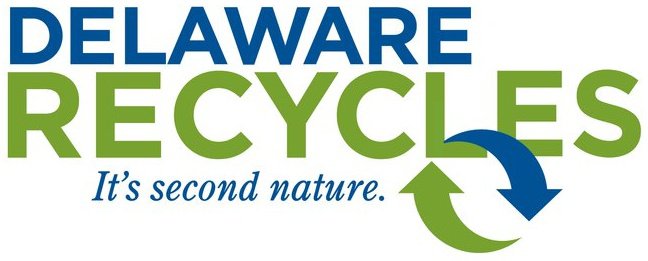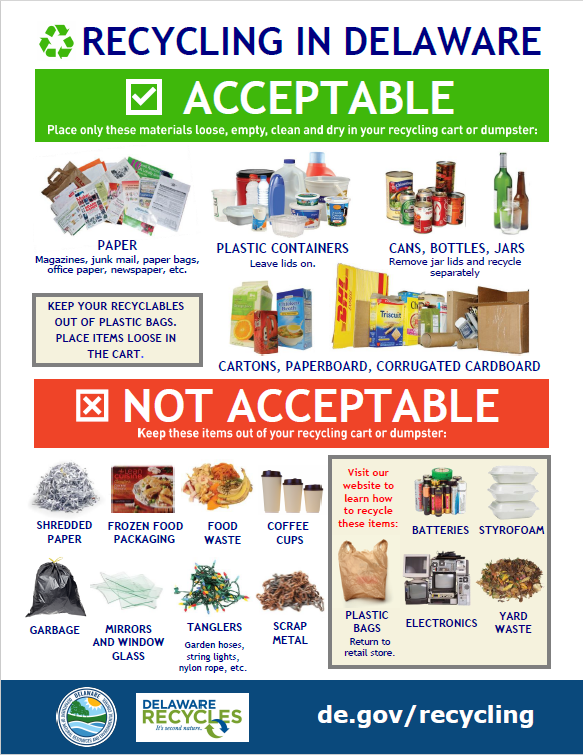Recycling conserves valuable natural resources and energy, reduces greenhouse gas emissions and helps us take responsibility for our waste today, as opposed to leaving a burden for future generations.

Recycling is an economic engine that has created job opportunities in Delaware and has significantly reduced Delaware’s rate of trash disposal while extending the life of our landfills.
Recycling in Delaware is managed under the Universal Recycling Regulations (7 DE Admin Code 1305) and the Regulations Governing Solid Waste (7 DE Admin Code 1301).

Delaware has one recycling program that is the same whether at home, at work or at school. Use our Recyclopedia search tool to know what is acceptable to recycle in Delaware and how to properly dispose of all your waste.
Recycling programs differ from state to state. Let Recyclopedia be your guide to properly managing your wastes in Delaware. Some items are acceptable to put in your curbside recycling cart or dumpster. Other items must be taken to a drop-off site to be recycled.
Download the Recycling in Delaware poster (Y en español) to post by your recycling bin.
Place acceptable recyclables loose (not bagged) into your curbside recycling cart or dumpster. Never place them in a plastic bag or garbage bag. Bagged items will not be sorted and will end up in the landfill.
Completely empty all containers before recycling; there should be no food waste.
Plastic bags should never go into your recycling cart or dumpster. Return them to the store using the at-store drop-off bins.
Retail stores in Delaware no longer provide plastic bags at checkout. Bring your own reusable bag with you when you shop.
The enhanced plastic bag ban was passed by the Delaware General Assembly in 2021. It expanded a 2019 bag ban to all retail stores (excluding restaurants) regardless of size. The law bans all plastic bags at checkout.
Learn more at de.gov/bags. Email any additional questions to recycle@delaware.gov.
Under Delaware’s Universal Recycling Law, all waste haulers who provide residential trash collection services must include recycling collection service. The law also requires businesses, schools, non-profits and governments to participate in a comprehensive universal recycling program.
DNREC offers free, non-regulatory assessments of commercial waste streams and waste management practices. DNREC works with the Recycling Public Advisory Council and the Delaware Solid Waste Authority to promote and support recycling in Delaware.
Some special wastes may require certain handling procedures and may pose a threat to human health or the environment. Keep these materials separate from regular trash and out of landfills. Many of these materials can be recycled through one of several programs or they can be taken to a Household Hazardous Waste Collection event.
The Division of Public Health offers prescription drug take-back events and medication collection boxes at several locations. Many police stations also have collection stations available. Do not flush unwanted medication down the toilet, it contaminates our water.
The Delaware Solid Waste Authority accepts electronics for recycling at several locations throughout the state and at regularly scheduled collection events.
Used oil and oil filters are accepted at several DSWA Drop-off Centers as well.
Yard waste may not be disposed of with your trash or in Delaware landfills. The best way to dispose of yard waste is to recycle it on-site.
You can “grasscycle” by using a mulching mower blade and leave grass clippings to enrich your lawn. Compost yard waste and certain kitchen food scraps for use on your lawn or garden.
Your waste hauler may offer yard waste collection, or you can take it to a drop-off facility.
Related Topics: recycling, recyclopedia, solid waste, waste, waste and hazardous substances